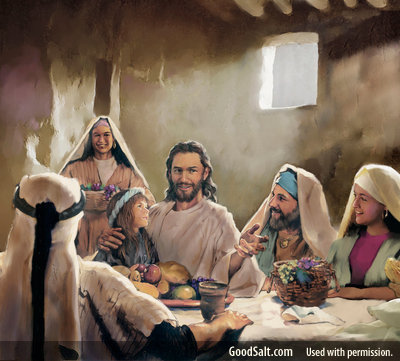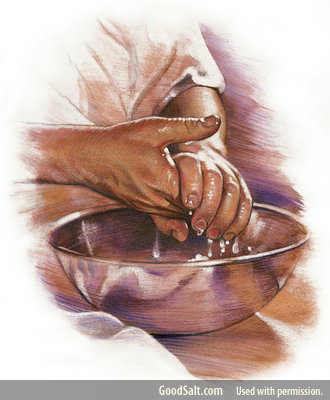(Mark 7:17-19) Didn’t Jesus Declare All Foods Clean?
“After he had left the crowd and entered the house, his disciples asked him about this parable. ‘Are you so dull?’ he asked. ‘Don’t you see that nothing that enters a person from the outside can defile them? For it doesn’t go into their heart but into their stomach, and then out of the body.’ (In saying this, Jesus declared all foods clean.)” (Mark 7:17-19, New International Version, words in parenthesis in the original)
 Before we take a deeper look at this, let’s compare the above version with the King James Version and pay careful attention to the differences:
Before we take a deeper look at this, let’s compare the above version with the King James Version and pay careful attention to the differences:
“And when he was entered into the house from the people, his disciples asked him concerning the parable. And he saith unto them, Are ye so without understanding also? Do ye not perceive, that whatsoever thing from without entereth into the man, it cannot defile him; Because it entereth not into his heart, but into the belly, and goeth out into the draught, purging all meats?”
Did Jesus really declare all foods clean? Well, the answer is yes, and no. He did declare all foods clean, but not in the way that you might think. No, He did not declare all foods clean if you believe that unclean creatures were ever designed as food. Jesus never changed His Father’s Law of design. Jesus did not suddenly change the animals’ DNA nor ours. Unclean creatures are scavengers, and they are designed with the capability to consume and digest poisonous toxins. Jesus did not change this, nor did He change our ability to consume and digest poisonous toxins from unclean creatures without any side effects.
But at the same time, Jesus did declare all foods clean because all food is clean. Anything that was not designed for food remains unclean (i.e. not food), while everything designed for food remains clean.
However, clean and unclean creatures is NOT the topic of what's going on in Mark chapter 7!
What is the Context?
The whole context of this discussion Jesus is having with the religious leaders concerns the ritual washing of the hands before eating.
“Then came together unto Him (Jesus) the Pharisees, and certain of the scribes, which came from Jerusalem. And when they saw some of His disciples eat bread with defiled, that is to say, with unwashen, hands, they found fault. For the Pharisees, and all the Jews, except they wash their hands oft, eat not, holding the tradition of the elders. And when they come from the market, except they wash, they eat not. And many other things there be, which they have received to hold, as the washing of cups, and pots, brasen vessels, and of tables. Then the Pharisees and scribes asked Him, Why walk not thy disciples according to the tradition of the elders, but eat bread with unwashen hands?” (Mark 7:1-5)
Keep in mind this is talking about a ritual washing and not about simply washing your hands before you eat for hygiene purposes. Notice how it's worded in the New English Translation:
 "And they saw that some of Jesus’ disciples ate their bread with unclean hands, that is, unwashed. (For the Pharisees and all the Jews do not eat unless they perform a ritual washing, holding fast to the tradition of the elders." (Mark 7:2, 3)
"And they saw that some of Jesus’ disciples ate their bread with unclean hands, that is, unwashed. (For the Pharisees and all the Jews do not eat unless they perform a ritual washing, holding fast to the tradition of the elders." (Mark 7:2, 3)
This ritual washing was an added rule required by the Pharisees. The context is clear we are discussing “the tradition of the elders” and not about God’s Law. This washing involved pouring water on both hands, lifting them up so the water ran down the wrist and forearm, and then rubbing the hands together.
Jesus lovingly rebuked the Pharisees saying:
“… Well hath Esaias (Isaiah) prophesied of you hypocrites, as it is written, This people honoureth Me with their lips, but their heart is far from Me. Howbeit in vain do they worship Me, teaching for doctrines the commandments of men. For laying aside the Commandment of God, ye hold the tradition of men, as the washing of pots and cups: and many other such like things ye do. And He said unto them, Full well ye reject the Commandment of God, that ye may keep your own tradition.” (Mark 7:6-9)
The list of clean and unclean creatures found in Leviticus 11 and Deuteronomy 14 are NOT “doctrines [and] commandments of men.” They are “the Commandment of God.” So again, we are NOT discussing God’s Law here. Jesus would never have taught anyone to go against God’s Law:
“Think not that I am come to destroy the Law, or the Prophets: I am not come to destroy, but to fulfil. For verily I say unto you, Till heaven and earth pass, one jot or one tittle shall in no wise pass from the Law, till all be fulfilled. Whosoever therefore shall break one of these least Commandments, and shall teach men so, he shall be called the least (least likely to remain) in the kingdom of heaven: but whosoever shall do and teach them, the same shall be called great in the kingdom of heaven.” (Matthew 5:17-19)
"Nothing That Enters a Person
From the Outside Can Defile Them?"
When Jesus says, “Don’t you see that nothing that enters a person from the outside can defile them?”, He’s not talking about unclean creatures such as swine and shellfish. He’s talking about what will enter the body if someone does not perform the ceremonial washing first. Touching something out in the marketplace, such as a gentile, or an object used in pagan worship will not defile your hands and body as they believed. Nor will a little dirt kill you. Therefore, the ceremonial washing was a useless practice that Jesus rejected. Jesus continues and defines what does defile a person:
“And He said, That which cometh out of the man, that defileth the man. For from within, out of the heart of men, proceed evil thoughts, adulteries, fornications, murders, Thefts, covetousness, wickedness, deceit, lasciviousness, an evil eye, blasphemy, pride, foolishness: All these evil things come from within, and defile the man.” (Mark 7:20-23)
So, it is sin that defiles mankind because it enters the heart, unlike food which enters the stomach and then is purged out. What is sin? "Whosoever committeth sin transgresseth also the Law: for sin is the transgression of the Law." (1 John 3:4). What is found in the Law? Yes, the instructions on clean and unclean creatures (Leviticus 11; Deuteronomy 14).
Jesus "Declared" all Things Clean?
Jesus never said that all creatures are now clean. He never even said all plants such as Deadly Nightshade, Poison Oak or even the most poisonous plant in the word, The Oleander, are fit to eat. What He said was, all foods are purified through the process of excretion into the sewer – “it entereth not into his heart, but into the belly, and goeth out into the draught, purging all meats (foods)?” (King James Version). A little dirt is no match for our digestive system – after all, we were created from the dust of the ground. Food being considered "ritually unclean" is of no concern. Commenting on this verse, Adam Clarke writes:
"Purging all meats? - For what is separated from the different aliments taken into the stomach, and thrown out of the body, is the innutritious parts of all the meats that are eaten; and thus they are purged, nothing being left behind but what is proper for the support of the body." (Clarke's Commentary)
This again cannot be referring to creatures that God says are unclean. Anything deemed nutritious or proper for the body found in unclean creatures is defiled by it's DNA of uncleanness, which makes them completely "innutritious.' It's not that these animals are evil, they just were NEVER designed to be fit for food.
In fact, the phrase found in many of the modern translations (such as the New International Version) that says, “In saying this, Jesus declared all foods clean” is not found in the Greek. The words are καθαρίζων πάντα τὰ βρώματα which mean “cleansing (purifying) all the food.” The phrase “In saying this, Jesus declared …” is not there! See for yourself in the interlinear below:

Take a look how Matthew quotes Jesus:
“And Jesus said, Are ye also yet without understanding? Do not ye yet understand, that whatsoever entereth in at the mouth goeth into the belly, and is cast out into the draught (sewer)?” (Matthew 15:16, 17)
Matthew adds no more comment about purification. In Mark’s account he adds that last phrase "purging all foods" in connection with "the belly", not to anything that Jesus is "declaring." All Mark is saying is that all clean foods are purified from minor impurities through the process of excretion and it should never be regarded as ritually unclean as taught by the tradition of the elders. Keep in mind that Jesus, Mark and Matthew are saying it's the stomach (the whole digestive system) which purifies the food. They are not saying that Jesus is miraculously "declaring" unclean things, such as swine and lobsters, are now clean and fit for food.
"This long section dealing with defilement begins with a question from the Pharisees about eating with unwashed hands (verse 7). Christ's answer never strays from this point; He is addressing ritual washings that the Jews added (verses 7-9), not unclean meats. Verse 19, however, is often cited as proof that Jesus declared all foods clean. Yet He is speaking about the human digestive system! He says that whether one washes his hands or not, the digestive tract handles, or 'purifies,' all food the same way. He then moves to the more serious issue of a man's conduct, which is what truly defiles him." (Richard T. Ritenbaugh, bibletools.org/clean and unclean meats)
Paul dealt with this same issue with the Corinthian believers (1 Corinthians 8; 10:19-33). However, in Paul’s case he was dealing with clean creatures which had been offered to idols by unbelievers and now sold as meat in the marketplace. He echoes Jesus’ teaching that no clean creature can become ritually unclean. (See the article entitled: Isn’t “Every Creature” Good To Eat Now? for more on this).






